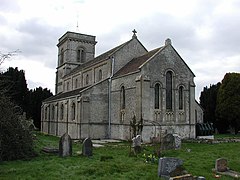Farrington Gurney
| Farrington Gurney | |
|---|---|
 Church of St John the Baptist |
|
| Farrington Gurney shown within Somerset | |
| Population | 901 (2011) |
| OS grid reference | ST629556 |
| Unitary authority | |
| Ceremonial county | |
| Region | |
| Country | England |
| Sovereign state | United Kingdom |
| Post town | BATH |
| Postcode district | BS39 6 |
| Dialling code | 01761 |
| Police | Avon and Somerset |
| Fire | Avon |
| Ambulance | South Western |
| EU Parliament | South West England |
| UK Parliament | |
| Website | www |
Farrington Gurney is an English village and civil parish situated in Bath and North East Somerset unitary authority. The village lies on the junction of the A37 and the A362 in Somerset. The parish has a population of 901.
In the Domesday book the village was known as Ferentone. The second part of the name is believed to come from the Gournays, its ancient possessors, including Robert de Gournay in 1225. Sir Thomas de Gournay was concerned in the murder of Edward II at Berkeley Castle, for which his estates were confiscated, and Farrington was later annexed to the Duchy of Cornwall.
The parish was part of the hundred of Chewton.
The manor house is believed to date from 1637 and the old parsonage from around 1700.
Industry included coal mining on the Somerset coalfield from about 1780 but the local pits closed in the 1920s.
There used to be an unmanned railway station or "halt" between 11 July 1927 and 2 November 1959, when the Bristol and North Somerset Railway line closed.
The parish council has responsibility for local issues, including setting an annual precept (local rate) to cover the council’s operating costs and producing annual accounts for public scrutiny. The parish council evaluates local planning applications and works with the local police, district council officers, and neighbourhood watch groups on matters of crime, security, and traffic. The parish council's role also includes initiating projects for the maintenance and repair of parish facilities, such as the village hall or community centre, playing fields and playgrounds, as well as consulting with the district council on the maintenance, repair, and improvement of highways, drainage, footpaths, public transport, and street cleaning. Conservation matters (including trees and listed buildings) and environmental issues are also of interest to the council.
...
Wikipedia

